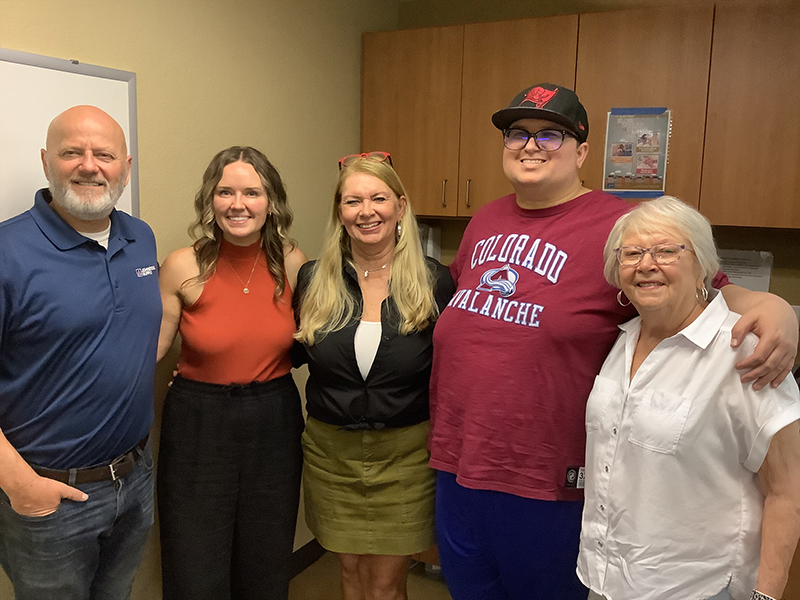The Evelyn Hendren Cassat Speech-Language-Hearing Clinic had a reason to celebrate in September when client Kurt White, alongside his family and graduate student clinicians, celebrated his participation in Aphasia Friendly Readings. Kurt had been working toward this goal during weekly speech therapy sessions and as part of a home program for several weeks leading up to his well-attended event by friends and family, both in person and on Zoom.
Aphasia-Friendly Readings is an aphasia treatment approach that was initially developed by a former client’s spouse, Harold Regier, and then adapted for the clinic by Dr. Erin O’Bryan, CCC-SLP assistant professor in the Department of Communication Sciences & Disorders. Inspired by his wife’s journey with aphasia and difficulty communicating, Harold took notice of her increased ability to speak when participating in reading scripts at church.
He brought the idea of this approach to Dr. O’Bryan in 2020, and she has been conducting research and teaching the method to other professionals ever since. The approach allows for maximal client engagement and family participation by developing a script regarding an important life event/memory as a collaborative therapy activity involving the person with aphasia, family member and speech-language pathologist.
Once the script is established, the person with aphasia and their family member practice reading it, with cuing and guidance from the speech-language pathologist, until the person with aphasia feels that they have improved enough that they are ready to share their story with an invited audience, such as friends and family.
“This experience was a good reminder that every person has a story to tell, and it was rewarding to be a part of helping Kurt tell his story,” said Tailyn Mellema, graduate student in speech-language pathology. “Even though words are hard for him to say, he has so many memories and ideas to share with the people around him. My favorite part of the experience was seeing all of his friends and family members show up to support him when he presented. It was so evident in his smile that he was excited to share his story with them and encouraged to hear all their kind words.”
Kurt’s aphasia-friendly reading was centered around a passion of his choosing: tattoos. He presented information regarding his large variety of tattoos, plans for a new tattoo and the meaning behind some of them. The story was accompanied by photographs and his mother partnered with him to complete the reading. Kurt’s speech was easily understood and without errors for the three pages of double-spaced reading he completed.
Friends and family commented on how impressive it was to witness someone who typically has difficulty in conversation speak clearly about a past experience that was important to him.
“This approach helped me understand more about Kurt than what he is able to share just in casual conversation,” said Alex, Kurt’s sister. “I realized there are details about his life that he remembers, and by bringing them out through this story reading, I can have more conversations with him about the things that make Kurt, Kurt.”
According to Aphasia.org, aphasia is an impairment of language, affecting the production or comprehension of speech and the ability to read or write. Aphasia is due to injury to the brain — most commonly from a stroke, particularly in older individuals. But brain injuries resulting in aphasia may also arise from head trauma, from brain tumors or from infections. The American Speech-Language-Hearing Association estimates 2 million Americans are living with aphasia.
Kurt has been living with aphasia and traumatic brain injury since 2016 and has been a client at The Evelyn Hendren Cassat Speech-Language-Hearing Clinic for the past five years.
“… Be open and willing to trust the process of the speech clinic and the goals that the clinicians set,” said Denise, Kurt’s mother. “Be patient with your aphasia family member as they know that others get frustrated when they can’t tell you the right words or explain what they mean. Also, be willing to spend extra time with them to help them with words, reading and daily tasks, so they feel important. Consistency and having a regular routine are also important for rehabilitation.”
The Evelyn Hendren Cassat Speech-Language-Hearing Clinic provides services for speaking, hearing, swallowing and spoken and written language impairments. For information about this specific aphasia treatment approach, or for other inquiries, please call 316-978-3289 or go to: wichita.edu/slhclinic.

